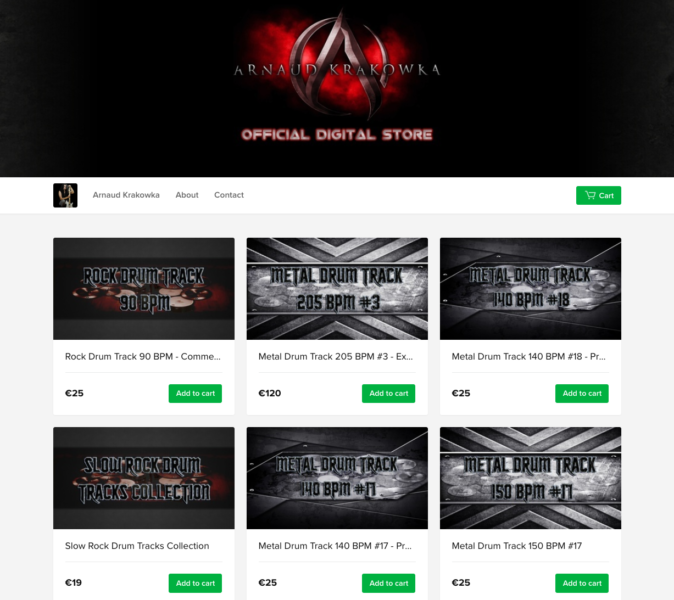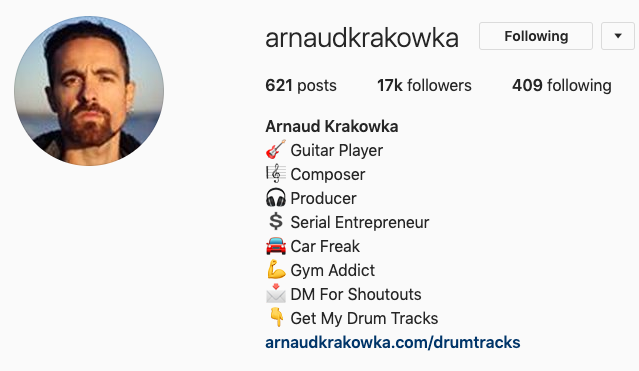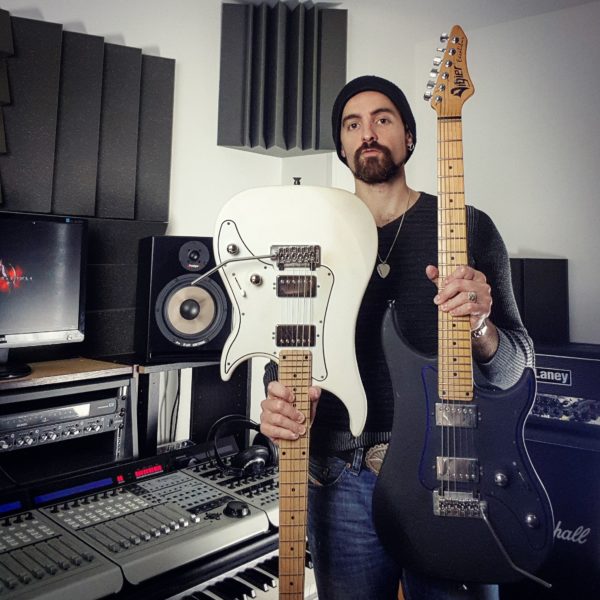Think outside the box: how Arnaud creates drum tracks that are used by the biggest names in the industry

Arnaud Krakowka has been producing Metal music since 2009 and he joined Sellfy in 2015 to sell his drum tracks. He has worked hard both on his music and his self-development. This combination of interests and an appetite for doing what hasn’t been done before have allowed him to build a successful online business. His customers include top industry artists and he’s only starting – he’s on a mission to transform how people make music. Here’s what he told us about his journey and keys to success.
How do you define yourself as a creator?
I’m a musician, guitar player, and producer. I produce drum tracks for musicians in all possible styles of rock and metal with various licenses. At first, I was mostly known for my guitar playing because of the records I made and, of course, for mixing as a producer. But now, I’m also known for my drum tracks, it has become my thing.
How did you come up with the idea to sell your drum tracks?
I’ve been involved in the music industry for quite some time now – I produced my first album in 2009 as a guitar player. It was my first experience with recording and it was very exciting. I got involved with the production side of things – I made three records and I produced for other artists as well.
At some point, I realized I wanted to come up with something that hadn’t been done before.
I had been thinking about it for quite some time and I saw that some other producers had backing tracks here and there, but it was a different system than what I came up with. I made it easier to find what you’re looking for and to buy it in a high-quality format, with a multitrack, which allows you to mix your songs properly. What I did was very different from what others were doing.
How long did it take you from having the idea to executing it?
I started working on the idea back in 2014. At that time, I had a YouTube channel and it wasn’t as developed as it is now. I wanted to see if there’s a market for my tracks and to validate my idea. So, I put a couple of tracks on my channel, and they got quite a good response, which sort of validated the idea for me. Back then I didn’t even offer them in download format, I was just gauging the market interest.
It took me a while to find a platform that was really suitable for my products. I needed a service where I could upload big files, something I could embed on my website easily. Sellfy had many different features that I really needed, and I developed the whole business model from there.
How do you create your drum tracks? How are they different from what other music producers are doing?
Others usually sell music, beats, which are like one groove, whereas I sell full drum tracks. They’re like full 3-4 minute songs with just drums. It’s different than having a groove that lasts 30 seconds. When you purchase a drum track, you’re buying a complete song that has a structure, a verse, chorus, etc. but just with the drums.
It amazes me when people send me the songs they’ve made with my tracks and the songs have nothing to do with what I had in mind or what other people are doing. It blows my mind every time!
Everybody sees the music in a different way, which means there are unlimited possibilities to create songs with each track. I think that’s a significant part of the success of my drum tracks – you can buy a bunch of drum tracks and make a whole record with them, and it will not sound the same as other people’s creations.
Quite a few people are making really professional recordings with the tracks. Some of them come back to me to do the productions, which is interesting in terms of business. It’s become a tool for me to get clients, production gigs and things like that. I’ve added a PDF document to my downloads that include instructions for the tracks, and there I also invite musicians to contact me if they need help with production, etc.
How do you deal with piracy?
I post videos of my tracks on YouTube for people to jam on. But, if they want to record their songs with the drum track, they need to have the drum parts separated, mixed and not mastered. If someone downloads a track from my YouTube videos, they get just a stereo version of the track, and it’s already been mixed and mastered. When they purchase the drum tracks on my website, they get the product in the mix-ready multitrack version. And only in that particular format, you’ll be able to make a proper professional recording.
I know that some people download my drum sets on YouTube instead of purchasing them, but it will never give you the same recording quality as the one I’m selling. So, I think that alone prevents quite a few people from downloading for free like that.
What licenses do you sell?
I have four kinds of licenses – non-commercial, premium, commercial and exclusive. You can get the same track, but the different licenses allow you to use the track in different ways. For example, if you’re just starting out as a musician and your only goal is to make a track and share it on Facebook, getting the non-commercial license is enough. You’ll be able to record the song and get the same quality as the exclusive license. And, as long as you’re just sharing it with your friends, that’s fine.
If you want to release your song, let’s say, on YouTube, where you can display ads, or you want to release your song on iTunes, Spotify, etc., then you need to purchase the commercial or the exclusive license. These will allow you to generate revenue from the song you made with the drum track. And once you’ve purchased that license, you’re entitled to not give royalties the song will generate. It’s a one-time payment. And, if you get a massive hit, that’s great, you don’t need to give any royalties back to me.
Do you remember your first sale with Sellfy? How long was it before you got the first sale, how did it happen?
I had been creating drum tracks for some time and I was looking for a platform to sell them. I joined Sellfy in June 2015 and I think it took a month or something like that to get the first sales. At that time, I didn’t have all the licenses, but I was really happy because if you have validated the concept even once, it means it can work.
If you can sell it once, you can sell it a hundred thousand times. After that, it’s all about marketing.

How did you build your audience who now buys your products?
Almost entirely through social media. I had a following in the music industry in general, but I’d say most of my clients come from social media. I’ve been working on my social media for the last five years and it’s been even more important now.
I’m mostly focusing on Instagram because the engagement on Instagram is off the charts. For example, I’ve found a way to get my tracks on Instagram stories. You can only display 15 seconds, so it’s a challenge. But, once you’ve got 10,000 followers, you can add a swipe-up link to your website. I changed the format and put that vertical Instagram format on my drum tracks and posted that as a story. My followers see these 15 seconds of the track, and they use the swipe-up link to my website where they can purchase the full track and licenses.

Which channel currently brings more traffic to your store, YouTube or Instagram?
For now, it’s still my YouTube channel because I’ve been on YouTube a lot longer and I’ve been developing it a lot. So, on YouTube, I have about half a million views a month, and that’s a lot of traffic that goes to the website. Instagram traffic is growing quite fast and I’m intending it to be at least as big as YouTube in the coming months.
What lessons have you learned on this journey of making and selling your drum tracks?
What I’ve learned is the principle that applies to any business in any field, and it’s thinking outside the box. It sounds cliché because many entrepreneurs talk about this, but it’s true! And it’s not just about the product itself, it’s also about how you promote the product.
It’s important to remember that if 99% of people do something because others say it’s successful, the niche is going to be saturated right away and you’ll have to move to another business. It’s an ongoing process and adjusting to the market is very important.
If you find a way to do something and promote it in ways that haven’t been done before, you’ll be outside of the noise where everybody’s trying to do the same thing and you’ll get a lot more exposure.
So, for me, it’s about thinking outside the box and never giving up. There have been some challenges here and there, of course. Sometimes, you think you’ve got it and you don’t. I’m now at a different stage, but I still have many more goals I want to achieve.
Another lesson is to always try to reinvent yourself. I’m always trying to move forward and nothing stays stagnant in all areas of my life.
It feels like 10 years ago, Metal and Rock music was very popular, but now it’s gone away from the mainstream a little bit. Do you feel that it’s affecting the way you do your business, has it made a difference?
I agree with you – it has left the mainstream and it has transformed. Right now, the successful Metal bands have integrated Pop elements into their production. I already saw that coming many years ago and I don’t think that’s a problem at all. But in terms of, let’s say, the purest form of Metal, it has gone more into the backseat of music, yes.
It does not affect my business because the market is still very big and it doesn’t mean that fewer people are interested in these genres. It just means that these people use different channels to show their interest and share what they like. It may even be better because my potential customers are right where I’m promoting my tracks, which is on YouTube and Instagram. If you’re able to show them your products, which you can do with hashtags and proper SEO, they’ll be there to get them.
Audio Engineering is becoming more and more digital, so it’s no longer required to have expensive equipment to record high-quality music. All the kids and musicians who are getting into the field now, they just need a computer, an external sound card, a guitar, and a program. They buy my drum tracks and they can make a full record with just these tools.

What advice would you give to someone who wants to start making money online with their music like you do?
I was looking for that same answer a couple of years ago. The key is to find something that hasn’t been done before. And it takes a while to figure it out. I was involved in the music industry, but I was also working on my self-development, I was into business, entrepreneurship, and online marketing. For me, it’s not just music, it’s a combination of things.
Sometimes, the odd thing with Musicians is that we’re only thinking about making great music. And I’m guilty of that myself, too. By itself, making great music is pretty much useless if you’re the only one that can use it and listen to it. I’d say – develop your skills and be a great musician – that’s the basis, the foundation. But also, develop a business sense and understand the rules of business, especially online business and online marketing.
You can take marketing advice from somebody else and work with marketers, but, at the end of the day, you’re the one creating your products and you should know where your market is. I’ve worked with marketers before and I know there are some amazing people in this field. If you know your product well and learn about these fields, I think you’ll be able to get it right as well.
Coming up with something unique and having a business sense is one thing, and the financial aspects are important, too. You need to be able to manage a budget and know how to reinvest. Financial education is very, very important.
What’s your goal for the future, what do you want to achieve in the next few years or over your lifetime?
When I first started doing this, my goal was to change the way people write and record their songs at home.
I’m also absolutely amazed and very grateful that I’ve had some extremely famous musicians making videos on Instagram with my drum tracks. Like John 5, the guitar player of Marilyn Manson made a post on Instagram where it was obvious he was using my drum tracks on his computer. That was amazing! I’ve had Gus G, who has played with Ozzy Osbourne, buy some drum tracks from me. So, I’ve had the top people at the highest level of the industry use my tracks and that, for me, was a huge goal. To me, it’s the best testimony for the quality of the product.
In terms of business goals, it’s to keep growing the business and to reach more people. That’s why I’m working on social media development so much now – I want to reach as many people as possible. I feel I have a mission to change the way people make music, and I believe that what I’m doing with the drum tracks will have a long-term effect.
Success stories







